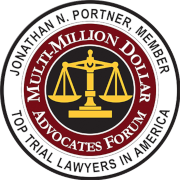BEL AIR, MARYLAND NURSING HOME NEGLIGENCE LAWYER
Legal Champions Standing Up for Elders
Many nursing homes work hard to create an image of competently managed facilities staffed by well-trained caring professionals. However, far too often, the reality is much different. After entrusting these facilities to care for their elderly loved ones, family members learn the horrifying truth that their elderly family members often suffer terrible injuries due to abuse and neglect.
Legal cases involving nursing home neglect are never straightforward or easily won. Nursing homes are notorious for putting up serious legal fights the moment they are accused of hurting a resident, intentionally or unintentionally. Our Bel Air nursing home abuse attorneys at Portner & Shure have been successfully representing nursing home negligence clients for more than 30 years. Recently, we have also been called to represent people who have lost loved ones due to COVID-19 spreading unchecked in local nursing homes.
See how we can help manage your claim by calling .
How to Identify Nursing Home Negligence
Individuals should be vigilant for signs that their elderly family members are suffering from abuse and neglect while in an assisted living center. This vigilance is required because elderly adults are often unable or unwilling to inform their family members that they are being abused or neglected.
Common signs of abuse or neglect include:
- Bedsores
- Weight changes
- Behavioral changes (e.g., depression, anxiety, etc.)
- Overmedication
- Family members discouraged from visiting
- Unexplained injuries or bruises
Types of Nursing Home Abuse
Federal law defines nursing home abuse as the “willful infliction of injury, unreasonable confinement, intimidation, or punishment with resulting physical harm, pain, or mental anguish." It is a crime that needs to be sorted by the authorities, but it is also an act that can be met with direct civil action like a lawsuit.
Nursing home abuse includes:
- Physical assault
- Sexual assault
- Imprisonment
- Mental and emotional abuse
- Deprivation of food, water, and medicine
While staff members perpetrate the abuse, nursing homes are often the source of the abuse. This is because nursing homes often fail to perform proper background investigations on their staff members, which can lead to hiring dangerous individuals.
Types of Nursing Home Neglect
Federal law defines nursing home neglect as the “failure to provide goods and services necessary to avoid physical harm, mental anguish or mental illness." Neglect happens unintentionally, but it can still be extremely dangerous.
Nursing home neglect includes:
- Failing to prevent bedsores
- Failing to prevent infections
- Failing to inform medical providers of medical issues
- Failing to prevent injuries such as falls
- Failing to prevent dehydration or malnutrition
As with nursing home abuse, nursing home neglect and negligence result from staffing issues. Nursing homes are ultimately responsible for these staffing issues as they either hire individuals that are either unqualified or unfit.
Nursing Home Negligence & Coronavirus/COVID-19 Cases
The negligence and neglect issues that nursing homes historically suffered have been amplified by the coronavirus pandemic. Nearly half of the deaths caused by COVID-19 in Maryland have occurred in nursing homes and assisted living centers.
Nursing homes are required to have written rules and procedures outlining the standard of care for elderly adults and to prevent neglect. Nursing home staff members often ignored these rules and procedures outright, which has increased the chances of the deadly virus circulating in the nursing home. The severity of this negligence has resulted in Maryland launching investigations and issuing citations to nursing homes.
Choose Our Legal Team Today
Portner & Shure, P.A. and our Bel Air, Maryland nursing home negligence lawyers are ready to take a legal fight to the nursing home that hurt your elderly loved one. We can pursue all available damages, like medical bills and residency costs. We are prepared to defeat any defense, like trying to blame your elderly loved one for injuries they clearly did not cause.
But we cannot get to work unless you let us, so call right away! Contact us online to arrange an initial consultation with our attorneys.

OUR ATTORNEYS, YOUR ADVOCATES
Serving Maryland, Virginia & Washington, D.C-
Jonathan N. Portner
Managing Partner
-
Simran Rahi
Litigation Partner
-
Richard D. Shure
Of Counsel
-
Valerie F. Portner
Of Counsel
-
Pablo Pérez Salido
Associate Attorney
-
Elizabeth Bermudez
Personal Injury Claims Manager
-
Norma Guevara
Director of Human Resources and Business Development
-
Sarah Sadler
Firm Operations Manager
-
Nandin Dave
Associate Attorney
-
Reginald Jordan
Associate Attorney
-
Kevin A. Ruby
In Memoriam 1972-2018
-
Beth Arbogast
Director of Information Technology
-
Arzoo Jiwani
Criminal Defense Division Manager – Virginia Offices
-
Claudia Hernandez
Criminal Defense Division Manager - Maryland Offices
-
Jennifer Flores
Paralegal
-
Teresa Rivera
Paralegal
-
Diane Lazo
Paralegal
-
Hyun Young Chung (Grace)
Paralegal
-
Michelle Ramirez
Paralegal
-
Christine Airey
Paralegal
-
Judith Flores
Paralegal
-
Belen Rodriguez
Paralegal
-
Natalie Solaja
Paralegal
-
Kelly Torres-Gonzalez
Paralegal
-
Brandy Moreira Soriano
Paralegal
-
Christine Phong
Paralegal
-
Audrey Lin
Paralegal
-
Cam Van Tran
Paralegal
-
Gisela Yung
Paralegal
-
Rosanna Yap
Accounting Department, Chinese Department Assistant
-
Rebecca Velazquez Pena
Immigration Intake Specialist
-
Ana Cordic
Associate Attorney
-
Geraldine Linares
Associate Attorney
-
Torrey Johnson-Hochanadel
Associate Attorney

WHAT OUR CLIENTS HAVE TO SAY
SERVING Clients throughout MARYLAND, VIRGINIA & WASHINGTON D.C.-
“The process was very quick”
- Former Client -
“From day one the phone call to this law firm was very attentive”
- M.W. -
“Highly recommend”
- H.K.

WHY HIRE US?
EXPECT MORE WITH PORTNER & SHURE-
We offer legal representation in English, Spanish, Hindi, Korean, Vietnamese, & Chinese languages.
-
We have aggressive litigation tactics, skill, and passion.
-
We have offices in Maryland, Virginia & Washington, D.C.
-
Over 30 Years of Experience Serving Clients
-
We have received countless 5-star Google & Facebook reviews.
-
We have recovered over $400 million on behalf of our clients.

When you hire Portner & Shure, you can expect more from your representation. In addition to getting an attorney, you will get a committed advocates you has your best interests at heart.







.png)












































